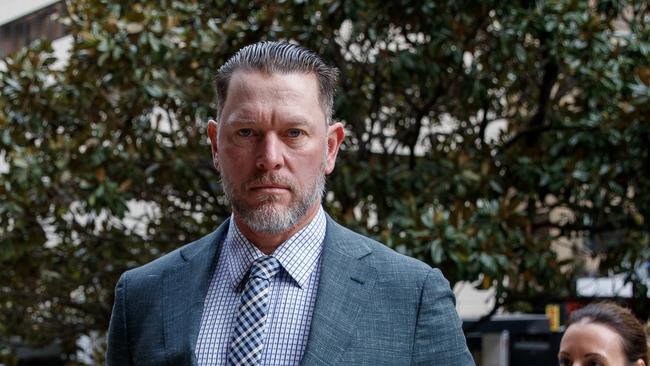Fellow soldier quizzed on alleged war crime footage
A former SAS soldier, who was ducked down in tall grass metres behind Oliver Schulz as he allegedly committed a war crime, was unable to say if anyone answered numerous calls asking whether Mr Schulz should shoot a local Afghan man.

A former SAS soldier, who was ducked down in tall grass metres behind Oliver Schulz as he allegedly committed a war crime, was unable to say if anyone in their troop answered Mr Schulz’s numerous calls asking whether he should shoot a local Afghan man.
The soldier, who cannot be named for legal reasons, was shown close to 10 minutes of footage from a helmet camera worn by the dog handler from their patrol.
The video, shown in the Downing Centre Local Court, was paused and slowed down at various moments so he could give his understanding of what unfolded on May 28, 2012, and decipher his own body language.
At one stage, Mr Schulz stands over local man Dad Mohammed, who he is now charged with murdering, having yelled out to his troop three variations of “do you want me to drop this c..t?” – ie, “do I shoot this person?”.
Mohammed had just “moved from the compound of interest”, the soldier told the court earlier, which is why it was “so pertinent” to intercept him. However, he couldn’t recall seeing that occur.
Knelt down in the grass behind Mr Schulz, the soldier turned his head and body towards another troop member 10m to 20m away and made a hand gesture or signal. He told the court he thought he was pointing over his shoulder to indicate “they were calling for him”.
The video showed that he then turned his head back towards Mr Schulz but he could not remember why. He said he didn’t remember “conveying anything” to Mr Schulz and had “no idea” if anyone responded to any of Ms Schulz’ calls.
Prosecutor Philip Strickland SC questioned in what circumstances a trooper would ask for permission to shoot someone.
“If they were uncertain (about) where we are in the ROE (rules of engagement) or escalation of force, they might seek some clarification,” he said.
Mr Schulz then allegedly shoots the man, who is laying in a wheat field, three times.
Mr Schulz, whose army colleagues have been called to give evidence as part of a committal hearing into his war crime murder charge over the past week, sat in the body of the courtroom.
He has not yet entered any pleas in the matter.
The soldier from Mr Schulz’ troop, who took the stand on Monday, was also asked to decipher a redacted letter to his girlfriend on May 29, 2012, which appeared to describe the events of the day before, and began: “Hello [name], how are you today?”
He wrote that he went to his room(and as soon as he sat down, someone came in and told him they would receive orders in ten minutes.
The soldier, in his letter, described the orders and the scene on the ground, some of which was replaced with “asterisks” so that he didn’t disclose any sensitive information.
“(They) told us about a guy running towards us with a (redacted)… And we moved into position to cut him off.
“I was the first one to see him and (redacted), causing him to drop his (redacted).”
He described in the letter that they lost sight of the man because he was in tall grass.
“One of the guys had a (redacted) so let him go. And it charged in and (redacted).”
Mr Strickland suggested it could have said that “One of the guys had a ‘military working dog’”.
The letter continued: “A little disappointing though, because I can’t claim it as (redacted).”
Asked what the asterisks meant there, the soldier said he had “no idea”.
“Sure you’ve got no idea?” Mr Strickland asked. “Positive”.
The former soldier said it was an “embellishment of the day” because “it clearly isn’t how things happened” and agreed he was probably trying to impress his girlfriend.
“I clearly wasn’t the first person to see anyone,” he said, referring to an earlier portion of the letter.
The letter continued: “We then ran up everyone else in the area and started (redacted) to find out who they were.
“We brought (redacted) back,” with the soldier suggesting that probably referred to the number of detainees.
The matter returns on Wednesday.



